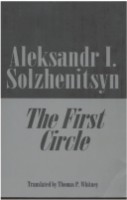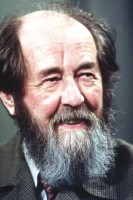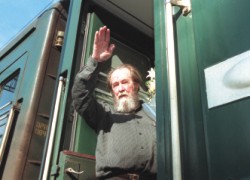|
Literature
Reading Solzhenitsyn in Moscow
A tribute to Alexander Isayevic Solzhenitsyn (1918-2008)
Razia Sultana Khan
 “A great writer is, so to speak, a second government. That is why no regime anywhere has ever loved its great writers, only its minor ones.” (From The First Circle) “A great writer is, so to speak, a second government. That is why no regime anywhere has ever loved its great writers, only its minor ones.” (From The First Circle)
“I have always believed in what I did and never acted against my conscience.” (From his last interview)
On Sunday, March 3, the world lost one of the best writers of our times. Given the circumstances of his troubled life and the years spent in labour camps, it is perhaps thanks to his creative muse that he lived to be 89. I was surprised at the grief I felt on hearing the news of his death; a sadness tinged with regret as one feels when a friend one has neglected passes away.
I was first introduced to Solzhenitsyn's work in Moscow in the early 1970's when Russia was still part of the Soviet Union. I was there with my parents. We lived in what was known as “diplomatic enclaves” -- blocks of apartments walled in and guarded at all times. It was for our own security, we were told, but this security was double-edged as our movement in and out of the enclave was noted at all times, as was that of our visitors.
There wasn't much chance to mix with the “natives” and most of the people I met and made friends with were young adults who happened to be with their parents or came to visit them. Very soon I caught the name Solzhenitsyn whispered among foreigners at parties when they were in secluded groups of twos and threes. It was said that a diplomat had managed to whisk in two of his novels which had been printed in the west and they were being passed around like hot cakes.
I had never heard of Alexander Solzhenitsyn before, could barely pronounce it but the word “banned” caught my attention and reeled me in like a hungry fish. The forbidden fruit. Obviously I had inherited Adam's genes. I don't know what my young mind envisioned as to the content of the book: steamy scenes? Graphic descriptions a la D.H. Lawrence? Orwellian fantasies? I had to read Solzhenitsyn.
I expressed my interest, in general, as an avid reader of English Literature. People listened, smiled, but made no comment.
 |
| Alexander Isayevic Solzhenitsyn |
Despite all the security imposed on foreigners, I did make a Russian friend. Rather, she sought me out in a park one day. Nadia's interest lay in South Asian culture and when she saw me the first time, she sang out a line from the chorus of “Awara” (Hindi movies, especially Raj Kapoor's, were extremely popular among young people in Moscow in the 70s).
Nadia lived with her 98-year-old grandfather, a Muslim from the Caucasus. We'd meet outside, some distance from the prying eyes of the enclave guards and she'd take me around Moscow. Not just the tourist spots but the real Moscow, restaurants with strange items on the menu, by-alleys and snaking lanes which led to underground cell-like rooms. We met people I'd never seen at parties, artists and writers who spoke out their thoughts.
One day while Nadia was making one of her rare visits to my house, I asked her what she thought of Solzhenitsyn. The muscles of her fair-complexioned face tightened.
“You don't want to read him,” she said, the beginning of a furrow marring her smooth forehead.
“Why not?” I persisted, “He's mentioned in Time and Newsweek magazines and…” I shot in the dark.
She picked up a Time magazine lying on the coffee table and after flicking through it tossed it back and said, “Lies, all lies. Don't believe what they write here.”
“But why would they lie?” I said softy, unwilling to upset her but feeling I needed to justify my parents who were always encouraging me to read “educational” magazines.
“If you want the truth you've got to read Pravda.” She said vehemently. “Pravda means “truth” in Russian and if you read this newspaper you'll get the truth.”
I wasn't prepared to debate on the veracity of the press, Russian or American, and I gracefully conceded. I didn't mention a conversation I'd overheard where one British visitor had said with a laugh, “They call it Pravda but it's full of lies.”
 |
Alexander Solzhenitsyn waves as he gets on a train in Vladivostok bound for Khabarovsk. |
If I wanted to read Solzhenitsyn, I decided, Nadia wasn't going to be much help. I tried asking around at parties, but the only response I got was wooden looks and pursed lips. Weeks passed and I concluded that the possibility of getting Solzhenitsyn's work in Moscow was just talk; some bored foreigner with nothing much to do, creating an aura of mystery to provide some excitement.
Weeks passed, then one day at a party a Russian girl I'd just met, a secretary to some diplomat or other, started a conversation with me. We established that we both enjoyed reading fiction. We compared notes on books we both had read and the difficulty of obtaining English books in Moscow. Suddenly she expressed the desire to take a walk in the garden. Happy to get out of the crowded, smoke-clogged drawing room, I walked out with her. She led, I accompanied, the ball of conversation flowing smoothly between us. We had wandered quite a bit into the garden and I noticed how the semidarkness created interesting shapes and movements. A little uncomfortable, I half turned to go back.
“Open your bag”. Though spoken quietly, the words had an explosive quality about them that hit me like invisible bullets. I froze. Adrenalin rushed to my brain and my vivid imagination drew graphic pictures of me lying sprawled in the bushes with the contents of my elegant beaded evening bag (a compact, a lipstick, a tiny crystal bottle of my favorite Russian perfume Moxit Bit and a cotton handkerchief) spewed around me.
“I have something for you. Just open your bag and put it in,” my walking companion said, not changing the tenor of her voice.
It says something for my naiveté that I did just that. Opened my bag and as soon as a square packet landed in it, started to zip it close. Of course it wouldn't zip completely. I could feel the sweat gathering in my forehead as I struggled with the zip and when I'd pulled it halfway, lodged the bag securely under my left arm.
“Don't open your bag till you're alone in your room. Don't mention this to anyone. If you're caught with it, it's your responsibility.” The lady turned around and resumed her leisurely stroll. I don't remember the rest of the evening, except that at some stage the pounding in my heart finally subsided.
Once home I locked my bedroom, drew the curtains and inched my bag open. I drew the packet out of my bag with all the caution and care deserving a bomb. A piece of twisted red and white twine tied the newsprint-covered packet. It was knotted so tight that I needed to cut through it. Inside was a large envelope and inside it a brown paper covered book. With trembling fingers I turned to the first page. It read The First Circle, with the name Alexander Solzhenitsyn below it.
I read well into the night, totally engrossed in the story of Gleb Nerzhin, a brilliant mathematician who is now a prisoner. With his story is uncovered the story of a number of other prisoners, from janitor to intellectual. The descriptions of prison life, the conversations, the background political information made for fascinating reading for an outsider living in the Soviet Union. It presented a different world to me, not just from my own cocooned life, but also from the sanitised version of the country that foreigners were exposed to. The grip of the unknown and anticipation of the unexpected kept me at the edge of my seat for the remainder of the book. The descriptions were so graphic, the style so blunt that images clawed their way into my memory and have remained there since. I remember how coloured my perception of Moscow was after reading the book. One incident in the book shows political prisoners being transported in innocuous vans marked “Kleb” (Russian for bread). Every time such a van passed, I imagined an intellectual crouched behind its solid steel walls or a poet committing lines of his poems to memory. I would squint though the single tiny grilled window near the roof of the van, hoping to catch a sign of life.
It was well that I was unaware of the penalty for reading Solzhenitsyn's banned works in the Soviet Union at that time. Imprisonment.
Cancer Ward followed the First Circle but this time I was more blasé about the whole process of getting hold of the book and had long discarded my slim evening bag for a less dainty, but more roomy one. It was a different “courier,” a different Russian girl. I never saw either of the women again.
Cancer Ward was intense from page one but I persisted and then the characters took over. I felt I was in the ward with the patients, feeling their confusion and despair. I wept for the young girl waiting for mastectomy, allowing her breasts to be touched by another young patient, for what was a source of pleasure would be thrown into the garbage heap the following day.
I found out that Solzhenitsyn memorised his novels since prisoners weren't allowed paper and pens. But that was much later.
One Day in the Life of Ivan Denisovich was perhaps my most favourite of Solzhenitsyn's works. Only 60 pages long, it covers 24 hours in one prisoner's life. The only work published in the Soviet Union at that time, it is a straight eyewitness description and lays bare the horrors of life for political dissidents in the Russian labour camps. Written in clipped sentences, it has fascinating details of camp life: the convict number painted on the left knee; the warning given to prisoners before they were marched off to work each day, that they would be shot if they tried to escape; the coffee made from scraping burnt toast.
How deceptively innocent the following passage sounds, how simple the language, how humanely dealt with:
“Shukhov always got up at once. Not today though. Hadn't felt right since the night before -- had the shivers, and some sort of ache. And hadn't really got warm all night. In his sleep he kept fancying he was seriously ill, then feeling a bit better. Kept hoping morning would never come.
But it arrived on time.
Some hope of getting warm with a thick scab of ice on the windows, and white cobwebs of hoar frost where the walks of the huge hut met the ceiling.
Shukhov still didn't get up. He lay on top on a four-man bunk, with his blanket and jacket over his head, and both feet squeezed into one turned-sleeve of his jerkin. He couldn't see anything but he knew from the sounds just what was going on in the hut and in his own gang's corner. He heard the orderlies trudging heavily down the corridor with the tub that held eight pails of slops. Light work for the unfit, they call it, but just try getting the thing out without spilling it! And that bump means Gang 75's felt boots are back from the drying room. And here come ours -- today's our turn to get our boots dried out. The foreman and his deputy pulled their boots on in silence except for the bunk creaking under them. Now the deputy would be off to the bread-cutting room, and the foreman to see the work-assigners at the HQ.” (One Day in the Life of Ivan Denisovich)
Solzhenitsyn was in Moscow the year we were there but obviously our paths never crossed. The year was 1970, the same year he was awarded the Nobel Prize for Literature though he refused to attend the award in Stockholm, fearing that he would not be allowed to come back. He was deported from the Soviet Union in February 1974. Solzhenitsyn spent 18 years in forced exile in rural Cavendish, Vermont, until finally returning to post-Soviet Russia in 1994.
(Razia Sultana Khan is a freelance writer)
Copyright
(R) thedailystar.net 2008 |
